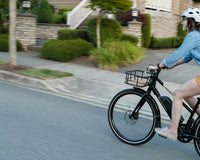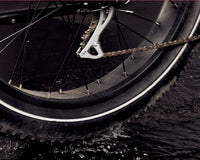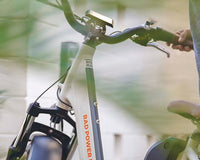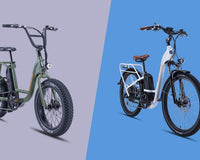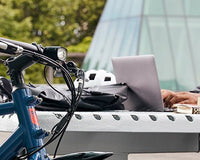“Update. My name is Chad. And I need a Kidney Transplant.”
The tweet was from Chad Corey.
In a former life, Douglas was a freelance sports photographer taking photos of high school sports teams for the local papers across southeast Minnesota, and Corey was a cameraman assigned to the same beat by an ABC affiliate.
By all accounts, the two had never been particularly close.
“You start seeing a lot of the same people at all the events, and because you're shooting sports photography, you kind of get the same angle,” Douglas, 53, told Rad Power Bikes. “You're usually standing in clusters in the same spot, so you just start talking to each other.”

He couldn't quite explain why, but he instantly felt driven to help.
“I don't know what it was," Douglas explained. "Something in my head just went, ‘You have to try. You have to at least try to see if you might be a match.”
Douglas, a business analyst at the Mayo Clinic, responded to the tweet with a direct message asking Corey how he was feeling and where he was in the process.
Five years earlier, Corey, now 35, was diagnosed with stage 3 kidney disease, the result of IgA nephropathy, an inflammatory condition of the kidney that makes it harder for them to filter waste out of the blood. He was put on medication and monitored. He hoped that the combination would keep things stable.
By that summer, it had progressed to stage 5.
“To hear somebody tell you to your face, ‘This is it. This is the point when your kidneys are failing, you're going to have to be on dialysis a couple times a week and you will eventually need a kidney transplant ...’ That was scary,” Corey recalled. “Even though you already have it in the back of your mind, it just didn't seem real.”
Corey spent half of August sick and in the hospital before going through the evaluation process to determine if he was a suitable candidate to receive an organ. He met the criteria; his kidneys were not responding to other forms of treatments, he had no other life-threatening conditions, and his overall health was solid enough to undergo major surgery. He ultimately got the OK by the board of the Rochester Mayo Clinic, one of six transplant centers in Minnesota.
“I was thankful for the second chance,” he said. I was 34 going on 35, not 85, you know? I have a lot more life to live. Getting an organ is better than doing dialysis for four hours at a time, three days a week, for the rest of your life.”
When Corey received the message from Douglas, he didn’t view it as anything out of the ordinary. He had been fielding questions from friends and family for days now. They had begun to become routine.
As a Mayo employee for over two decades, Douglas was well-aware of the donor process. He began taking steps that night to set up an evaluation to see if he could be a potential match.
If it seems unusual that someone would go to such lengths to help an acquaintance, that’s because it is. According to recent data from the National Kidney Foundation, donors are 73 percent more likely to be related to the recipient, either by blood or marriage.
For Douglas’s family, however, it was just par for the course.
“Out of everybody I know, he's the one most likely to do it,” Evan Douglas, Chris’s 25-year-old son (and a Rad Power Bikes employee), said.
Evan grew up watching his dad be, as he put it, selfless. He was always eager to help. He coached youth programs for wrestling and soccer. He volunteered for a charity that helped malnourished children. He was on the school board.
“This was kind of a capstone; a big exclamation point on all of that,” Evan said.
With the full support of his family and peers behind him, Douglas squared up for the long, daunting road of physical and psychological compatibility tests that laid ahead of him.
First on the list: He would need to lose a significant amount of weight. In 2018, Douglas was 255 pounds, a state that he jokingly described as “gelatinous.” To hit a BMI that was healthy enough for the surgery, he would need to lose roughly 40 pounds.
Douglas and his wife Heather had been introduced to ebikes by Evan in the fall of 2017. Evan, Rad Power Bikes’s Events Coordinator, had joined the company earlier that year when it was operating out of a converted warehouse.
When his parents visited Seattle, he borrowed two bikes and took them on an unofficial test ride. After going for a spin around the neighborhood, they came back beaming.
“It instantly clicked,” Evan recalled.
His father agreed. Within months, Chris and Heather purchased two RadCity ebikes.
“We could attempt longer rides that we never would have tried before,” Chris said. “We felt confident getting further and further from home and tackling tougher routes.”
By the time Douglas and Corey had first gotten in touch, the Douglas's had already used a combination of dieting and cycling to lose about 10 pounds each. With a potential surgery looming, Douglas doubled down.
“As we went on, and the weight was coming off, and we were getting in better shape, we used pedal-assist less and less,” he said. “The thing we really love about our Rad bikes is that you can get as much or as little exercise as you want.”
Within six months, he had succeeded. He dropped to 215 pounds. He was medically fit for the procedure.

Under federal law, transplant centers are not allowed to offer waitlisted organ recipients any information about potential donors, leaving that duty up to the discretion of the donors.
After the holidays wound down in late 2018, Corey was shooting a high school basketball game outside Rochester when he ran into Douglas, who was there to see his niece play.
“He asked me how Christmas and the holidays were,” Corey said. “Then he casually dropped that he was going to the Mayo clinic for a living donor evaluation in February.”
While he had culled bits and pieces of information from other potential donors, Corey had not yet heard from anybody who was so far along in the process. He was taken aback.
"It was kind of shocking. Like, why would somebody do this? It's not like he's family or we hang out all the time," Corey said.
Douglas promised to stay in touch. A week after he completed the evaluation, he phoned Corey with some good news.
“He called me in the morning,” Corey recalled. “And asked, ‘How would you like a new kidney?’”
Corey was stunned. He had no idea what to say. “I was grateful. I thanked him. It meant a whole lot, but how can you really tell somebody that?” he said.
The surgery took place in April this year.
According to Evan, his father remained serene through everything. He compared his dad’s attitude to that of a payroll accountant -- like someone just doing their duty.
Douglas also appeared far more interested in Corey’s wellbeing than his own during the recovery period.
“In typical my-dad fashion,” Evan said, “everything was focused on how Corey’s progress was going. He’d say things like ‘You know, it hurts a little, but Corey's doing incredibly.”
Douglas’s six weeks of bedrest went smoothly, although he did suffer from a little restlessness. He was quick to mention that as soon as his doctors told him he exercise again, he immediately jumped back on his bike.
“I think that first weekend I did bump up my pedal-assist to 2, even 3, for a few spots just because I was still recovering,” Douglas said. “It's amazing how much the surgery takes out of you. You're just exhausted and you get fatigued really easily.”
By the second weekend out from surgery, he was back to using pedal assist level 1 and counts his ebike as part of his regular fitness routine. To date, he’s lost about 90 pounds since his first ride two years ago, part of a two-pronged goal to both stay in shape and keep his remaining kidney functioning optimally. He’s also added 1,000 miles to his Radometer since surgery.
As for Corey, he’s proud to report that he has color in his cheeks and is feeling more energetic than he has in years.
“I feel good and my blood is good,” he said.
He also realized just how awful he had really been feeling in the years before the transplant.
“I was feeling like crap for so long that that was my normal,” Corey confessed. “I was spending a good 12 hours a week at dialysis. Sitting in a chair three days a week, it adds up.”
Douglas noticed the change when the two went out for lunch recently.
“He's back to 100 percent now too,” Douglas shared. “He's actually put on some weight. When you're on dialysis, there's a bunch of food that you can't eat, but now he's enjoying things like pizza again!”
While the two men began their ordeal as acquaintances, they have bonded over sports since the surgery. A few months ago, Douglas even took Corey to his first Major League Soccer game.
“We had a good time with that,” Douglas said. “You know, we're just genuinely happy to see each other.”





